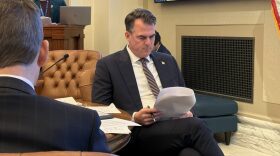The future began 20 years ago, according to a new book by W. Joseph Campbell. In 1995, Timothy McVeigh’s truck bomb killed 168 people in Oklahoma City and sparked a debate about security. The Dayton Peace Accords ended a brutal war in the former Yugoslavia. The O.J. Simpson trial captured the imagination of a nation. Bill Clinton and Monica Lewinski began their affair that led to the President’s impeachment. And 1995 was the year the internet went mainstream.
In his book 1995: The Year the Future Began, Campbell makes the case that 1995 was the first year of the 21 century. KGOU’s Jacob McCleland spoke with Campbell on Oklahoma Voices to talk about his book.
Some excerpts:
McCleland: You talk about the [Oklahoma City bombing] really giving the nation a psychology of fear. How did this fear manifest itself throughout the country following the Oklahoma City Bombing? And how is it still pervasive today?
Campbell: It is pervasive in the security related measures that I was referring to a moment ago. These measures intended to prevent a terrorist attack have only become more intense and more pronounced and more visible in the aftermath of 9/11, which was a terrorist attack of an order of magnitude greater if you will, or deadlier, than Oklahoma City. But the psychology of fear has remained and is visible in lots of different ways -- everything from clearing security at an airport, clearing security at a federal building, clearing security almost anywhere. You have to sort of make clear that you are not a prospective terrorist. It’s become really imbedded in the American experience, in the American consciousness these days.
The improbability of the attack in Oklahoma City, in the sense that, “Why Oklahoma City? Why would a domestic terrorist choose Oklahoma City for this, deep in the American heartland?” It was shocking, of course, not only in Oklahoma City but elsewhere in the country for that very reason -- the improbability. “Why Oklahoma City?” was a question a lot of people were asking across the country and that contributed to this psychology of fear as well. If it happened in Oklahoma City, my goodness, where else is vulnerable?
McCleland: Prior to the Oklahoma City bombing, was there really this conversation in the country about that trade off between civil liberties and security? Giving up a little bit of your civil liberties in favor of security from terrorism or random acts of violence? Was that conversation really even around before 1995?
Campbell: It was around in snippets. There had been terrorist attacks in the United States before 1995, of course, notably the bombing at the World Trade Center in 1993, which killed half a dozen people and injured many, many more. That set in motion some of the discussion, but it was a low level discussion. It wasn’t an intense discussion. It wasn’t an ongoing discussion. And then in the early and mid 90s, the United States is the lone superpower. It won the Cold War. It is sort of hitting stride as this sole remaining superpower. It’s a time in which the United States is growing into that role internationally and has some consequences domestically. But in terms of terrorism and preventing terrorism, the tradeoff that you alluded to of civil liberties or protection, it was a not a major conversation. However, it was on the horizon. It was there. It wasn’t as if Americans suddenly with Oklahoma City woke up to the threat of domestic terrorism or international terrorism. That was there, but it was a lower level threat, a lower level prospect.









